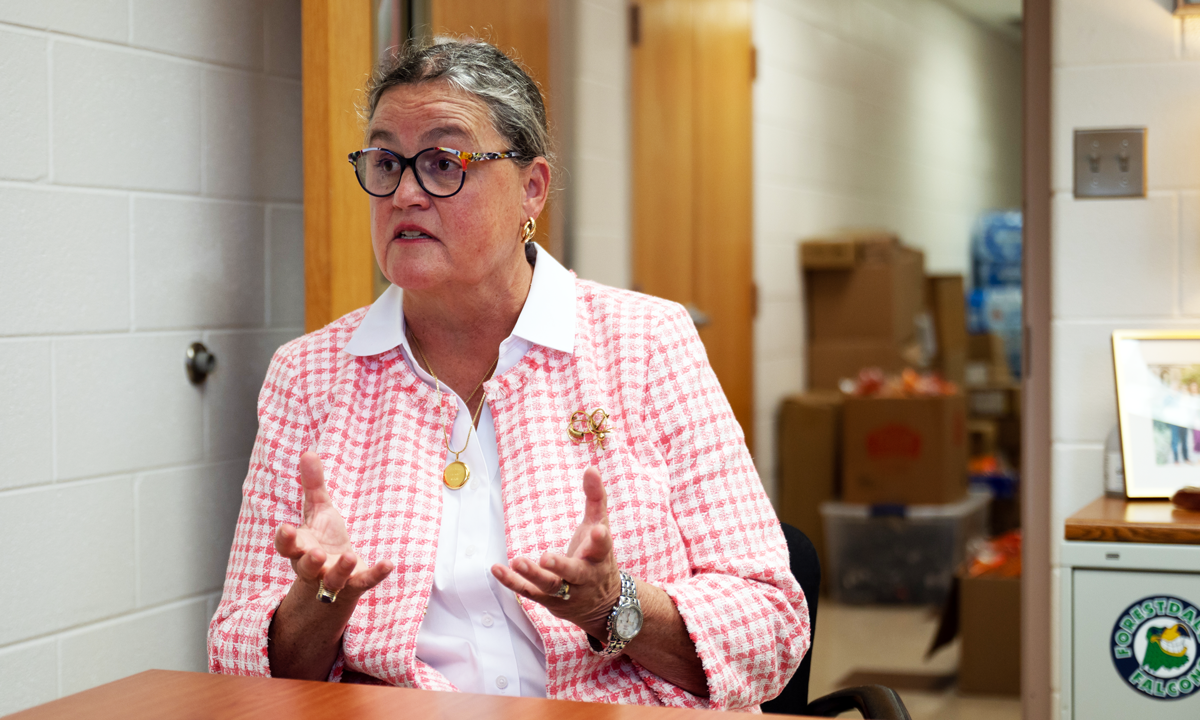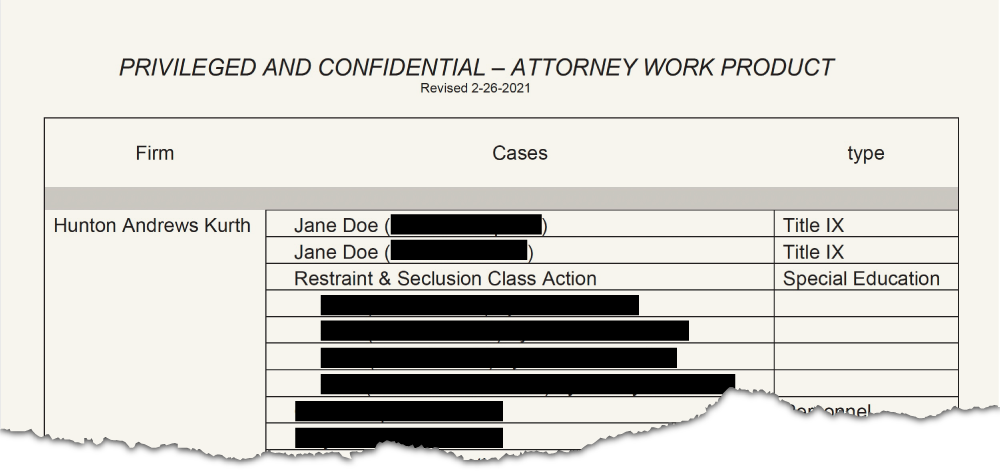Exposed Documents from Virginia’s Fairfax Schools Include Names of Alleged Sexual Assault Victims
Their identities were among an estimated 35,000 leaked accidentally to a parent. The district apologized for the incident and is investigating.

Get stories like this delivered straight to your inbox. Sign up for The 74 Newsletter
Among the tens of thousands of confidential documents accidentally released by the Fairfax County Public Schools last month were the names of two former students whose sexual assault allegations the district bitterly contested, including an appeal to the U.S. Supreme Court.
The students, 12- and 16-years-old at the time of the alleged incidents, said district officials failed to respond adequately to their reports — accusations they deny. In court, the students’ lawyers fought successfully for their right to stay anonymous.
“It’s completely irresponsible,” said Shiwali Patel, an attorney with the National Women’s Law Center, which wrote a brief supporting one of the former Fairfax student’s requests to keep her identity private. She said a lot of victims of sexual violence don’t come forward because they “don’t want to have their name out there in the public.”
The 74 reported Wednesday on the district’s release of records on an estimated 35,000 students to a parent who has been an outspoken critic of Fairfax’s data privacy record. District officials declined to comment on the specifics of the disclosures, but late Wednesday issued an apology and launched an “external legal investigation” to determine how staff released the documents.
Two weeks ago, Callie Oettinger, a special education advocate, went to her local high school to review what she thought were records she had requested on her children. But she ended up with a trove of digital files that included personal information such as addresses and disability diagnoses, and that named students who had engaged in self-harm or been hospitalized. “We are deeply sorry that this happened,” the district said, predicting the probe “could take some time” due to the large number of affected students.
In addition, Superintendent Michelle Reid responded to an email from Oettinger, saying that she had “spoken with staff and requested an immediate and thorough review into this deeply concerning matter.”
The documents also named students with disabilities involved in a class action lawsuit over the use of seclusion and restraint. Following a local news investigation, the district reported almost 1,700 instances involving over 200 students during the 2017-18 school year. Some students as young as six were isolated in a room dozens of times during the year. The case ended in 2021 with a settlement in which the district promised to phase out such practices by the end of last school year. Court documents only used students’ initials, but the documents released used their full names.
“Absolutely, student names should have been protected,” said Denise Marshall, executive director of the Council of Parent Attorneys and Advocates, a nonprofit that joined the parents who sued the district. She called the leak “an egregious breach of privacy.”

One of the documents on those students, labeled “attorney work product” and “privileged and confidential,” also contained the names of two former students involved in Title IX cases against the district. It identified them as “Jane Doe,” but then listed their real names in parentheses. Their last names were also included in an email from John Foster, the district’s general counsel, to board members about cases they’d discuss in a 2020 closed meeting.
In the first case, a plaintiff identified as Jane Doe was a 16-year-old Oakton High School student when she alleged that she was sexually assaulted during a three-day band trip in 2017. She sued in 2018, saying that officials violated Title IX because they knew about the allegations, but waited until the trip was over to address it. She alleged that the district discouraged her from contacting police and when they told her parents, suggested their daughter would face discipline for having sex while on the trip.
Doe won her case in the U.S. Court of Appeals for the Fourth Circuit, but it ended in a settlement last year after the U.S. Supreme Court declined to hear the district’s appeal. She received almost $588,000 in the settlement, but the district made no admission of responsibility. The agreement includes a stipulation that the district will always redact Doe’s real name from any copy of the document and only use a pseudonym when referring to the case.
Lawyers for both students declined to comment on the recent disclosures.
The second case, B.R. v. FCSB, is set for trial in March in a federal district court. B.R., as she’s named in the suit, was a 12-year-old student at Rachel Carson Middle School in 2011 when she said an older group of students repeatedly raped, tortured and threatened her with death over a four-month period. She alleged that they were part of a gang tied to sex trafficking in Northern Virginia.
While she later reported the alleged attacks to the police, she said the detective who investigated was a former school resource officer in the district who quickly closed the case. The district argued that staff responded appropriately, but a 2014 investigation and resolution by the U.S. Department of Education’s Office for Civil Rights concluded the district could have acted more quickly. As a result, the district updated its policies.
At 19, she sued the district and her alleged attackers, saying educators ignored her requests for help. The school district argued the case should be dismissed because she missed a deadline for requesting to use a pseudonym. The court ruled in B.R.’s favor, but the district appealed to the Fourth Circuit.
The National Women’s Law Center was one of 52 organizations that argued the case should continue, despite what it called a “procedural technicality.” In November 2021, the appellate court ruled in favor of the plaintiff.
“In many of these cases, plaintiffs are proceeding with a pseudonym. That is not uncommon,” Patel said. “For the district to push back against that is a bullying tactic. It doesn’t impact their ability to defend the lawsuit.”
Get stories like these delivered straight to your inbox. Sign up for The 74 Newsletter

;)
